Indige-FEWSS is grateful to our Community Partners and Advisory Committee for the collaboration and guidance as we work to strengthen food-energy-water security and sovereignty in the Navajo Nation and other Indigenous communities.
Indige-FEWSS Community Partners
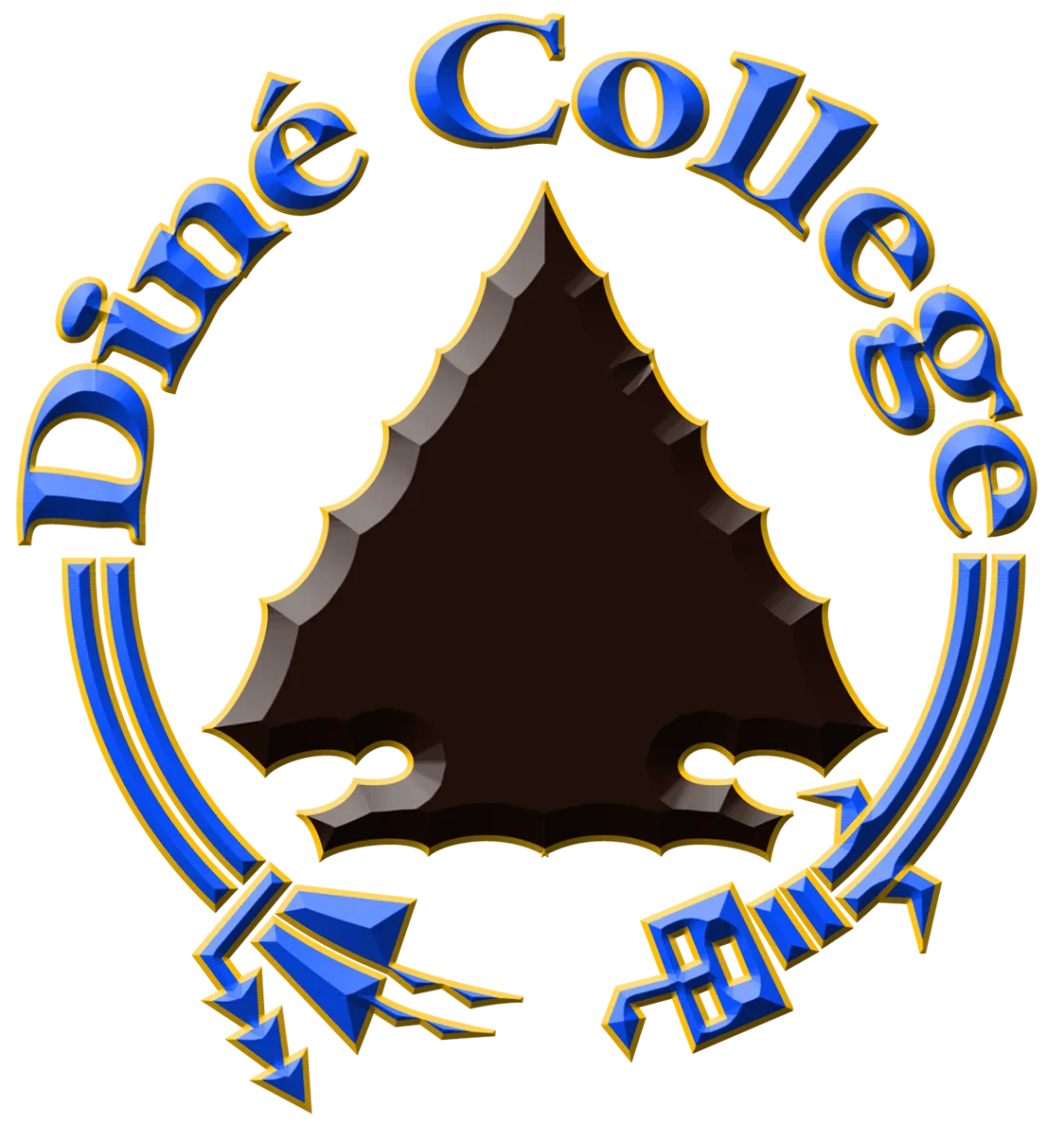
Diné College Land Grant Office, Diné College Faculty Partners: Benita Litson, Director, and Bryan Neztsosie, Research Associate.
The Diné College Land Grant Office is our main partner for community outreach for those interested in FEWS (food, energy, and water security) technologies and available trainings pertaining to the solar nanofiltration device for water and the solar powered greenhouse and pilot units.
Projects:
- Curating a community-sized solar nanofiltration unit for demonstrations and trainings.
- Integrated solar greenhouse with nanofiltration device. Multiple growing methods in the greenhouse allow community members and students to access training in a controlled environment in agriculture.
Diné College STEM Department, Our Diné College STEM Department Faculty Members: Dean James Tutt, Professor. Univeristy of Arizona Faculty Inculde: Donald K. Robinson, Professor, Demetra Skaltsas, Professor and Shazia Tabassum Hakim.
Grants:
- The USDA-NIFA Bridge to STEAM Grant provides a pathway for tribal college undergrads to pursue higher education and career preparation at the University of Arizona.
- The USDA-NIFA-TCRGP Grant Award # 2021-38424-33465 "Navajo Nation Water Reuse Project" is a three-year project that will train next-generation water industry professionals in the field of wastewater treatment and reuse.
Diné College, Environmental Institute, Diné College Faculty: Perry H. Charley, Director, Neilroy Singer, Student and Outreach Coordinator, and Selina Yazzie, Program Coordinator.
Our partners at the Environmental Institute of Diné College allow collaborations on the ICE-TI grant to provide summer STEM research internships to undergraduate students.

Superfund Research Program, University of Arizona Faculty: Dr. Karletta Chief, Co-PI of the SRP Community Engagement Core.
The CEC supports Indige-FEWSS student employees who assist with community engagement, communications, events and social media. The SRP co-sponsors many training and outreach events and supports the seminar series Native Voices in STEM.

Agnese Nelms Haury Program in Environment & Social Justice
To achieve its vision, the Agnese Nelms Haury Program in Environment and Social Justice supports people and innovative collaborations between the University of Arizona and community organizations that improve water resilience, with particular emphasis on the water access and quality challenges that face Native American and Indigenous people.
Collaborations:
- Nikki Tulley Profile
- Navajo Safe Water: Protecting you and your family's health
- Off-Grid Water Purification Units in Navajo Nation
- Bridge to STEAM Summer Research Experience for Diné College Students, University of Arizona Faculty: Karletta Chief, Cara Shopa, Jennifer Fields, Office of Societal Impact, STEM Learning Center, ASEMS Program, Office of the Provost, Assistant Vice Provost for Native American Initiatives (Karen Francis-Begay).

Sixth World Solutions, SWS Partners: Janene Yazzie and Kern Collymore, Founders
Project:
- Sixth World Solutions and Indige-FEWSS were awarded an Arizona Institute for Resilience grant to address water access and quality on the Navajo Nation.
- Constructing four solar nanofiltration units for household use on the Navajo Nation and providing training for Navajo technicians to build, maintain, and operate these units.
University of Arizona Project Personnel: Vicky Karanikola, Bob Arnold, Andrew Curley, Karletta Chief, Abolhassan Mohammadi Fathabad (Trainee), Torran Anderson (Community Engangement Coordinator), Cara Shopa (Program Coordinator), Jackie Rybin.

DIGDEEP, Partner: Emma Robbins, Navajo Water Project
Project:
- Position two large solar nanofiltration units at chapter house locations in Navajo Mountain and Thoreau for community demonstration projects and potable water supply.
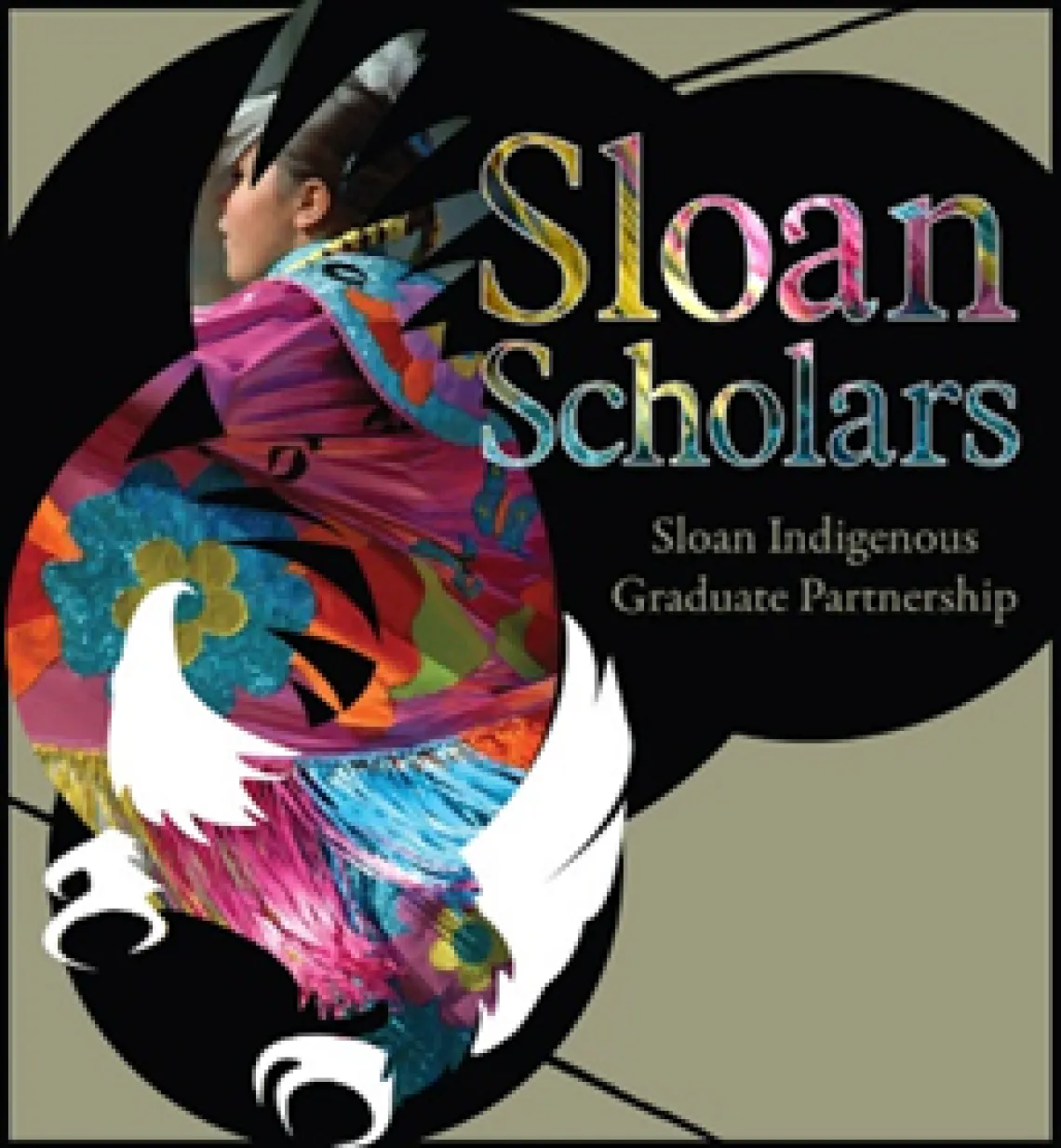
University of Arizona - Sloan Indigenous Graduate Partnership, University of Arizona Faculty: Frans Tax, Donna Treloar, and Ronald Trosper
Projects:
- The University of Arizona-Sloan Indigenous Graduate Partnership is a co-sponsor for the Native Voices in STEM seminar series. They also provide opportunities for graduate students to build community and support networks on and off campus.
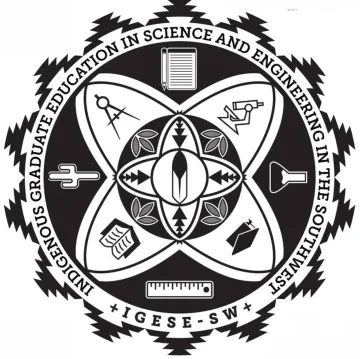
Indigenous Graduate Education in Science and Engineering - SouthWest, Univeristy of Arizona Faculty: Allison Huff, PI, Daniel Kilper, Jeremy Garcia, Karletta Chief, and Ronald Trosper. University of Montana Partner: Sweeny Windchief.
Projects:
- The IGESE-SouthWest was a co-sponsor for the "Communicating for Societal Impact Workshop" in 2021. They also provide trainings and professional development opportunities to Native American graduate students and our Indige-FEWSS trainees.
Indige-FEWSS Faculty Labs and Centers
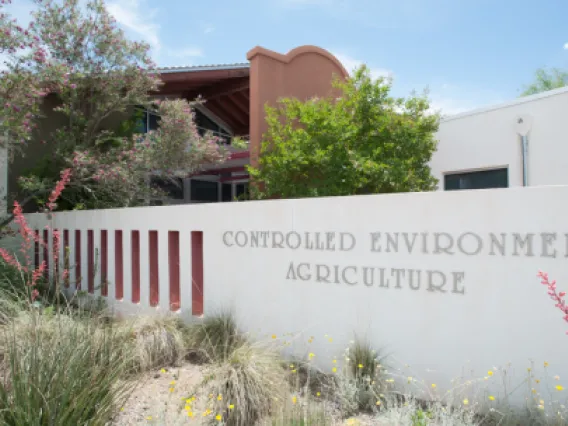
Controlled Environment Agriculture Center (CEAC)
The Controlled Environment Agriculture Center (CEAC) is a science- and engineering-based interdisciplinary program for education, research, outreach and project/business development with focus on controlled environment systems for food production. Improved resource utilization (water/nutrients, energy, labor and information) is achieved through studies in plant physiology and production, as well as computer monitoring and control systems. Facilities include laboratories and greenhouses for research, teaching and demonstration/production, as well as growth chambers and closed environment systems.
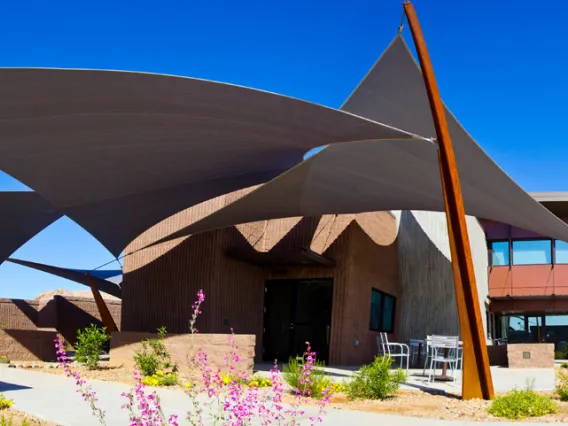
Water & Energy Sustainable Technology (WEST) Center
WEST Center facilitates innovative research and technology development to ensure sustainable water supplies that protect and promote environmental and human health. Critical to WEST’s success is the partnership between the University of Arizona, the private sector, utilities, and the community at large.
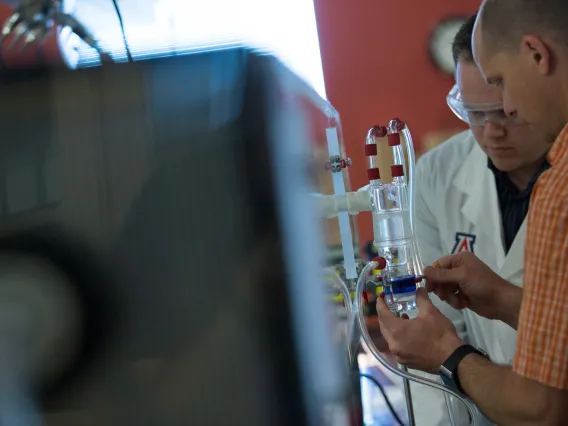
Simmons-Potter Laboratory
The Simmons-Potter Laboratory is the research center for Indige-FEWSS Trainees with interests in renewable energy systems and linear and nonlinear response of optical materials and devices to ionizing and non-ionizing radiation.
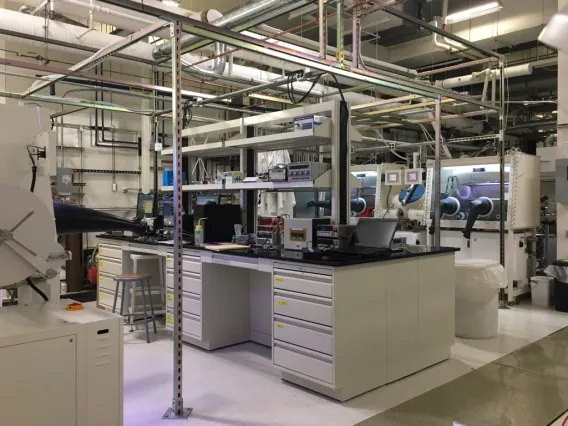
Ratcliff Laboratory
Laboratory for Interface Science of Printable Electronic Materials.
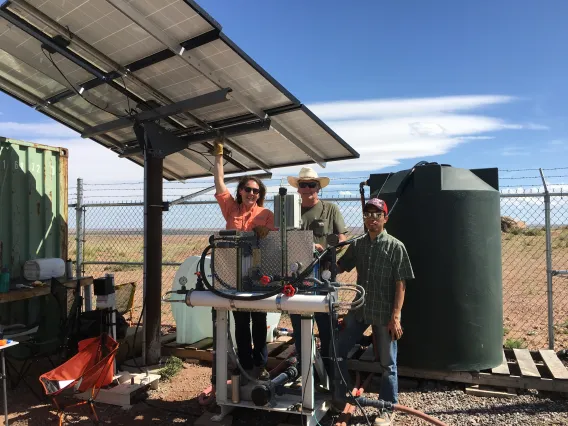
KORES Laboratory
The KORES lab focuses on advanced water and wastewater treatment processes with particular interest on material and process optimization at the water-energy nexus interface. We use fundamentals to improve performance of processes while bridging the gap between the lab scale and real life application through vigorous cost and energy optimization techniques.

ALEC Laboratory
The laboratory facility is dedicated to providing state-of-the-art analyses of organic and inorganic micro-pollutants to faculty, staff and students engaged in water sustainability research. Our intent is to develop novel analytical and bioanalytical (e.g. in vitro) methods for effective detection, quantification, and measurement of biological effects of trace contaminants in real-world matrices, and to apply these methods to the diversity of sample types being investigated by researchers at Arizona's three state universities.
University Sponsors and More Community Partners

University of Arizona Department of Environmental Science

University of Arizona School of Natural Resources and the Environment, 2020-2021 co-sponsor for the Native Voices in STEM seminar series

University of Arizona Superfund Research Program Community Engagement Core, Karletta Chief, co-PI

Indigenous Co-Innovation at the Nexus of Food, Energy & Water Systems (NSF #DGE1633740) Partnership with Diné College, University of California at Berkeley Blum Center, University of South Florida
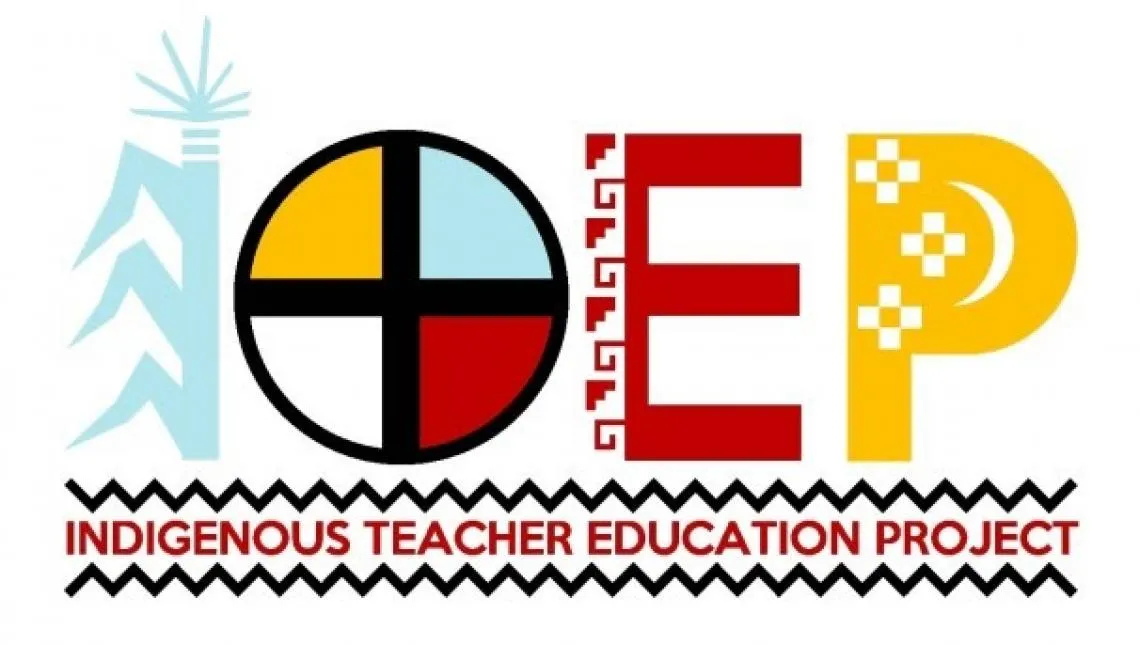
University of Arizona Indigenous Teacher Education Program, Valerie Shirley, Co-PI
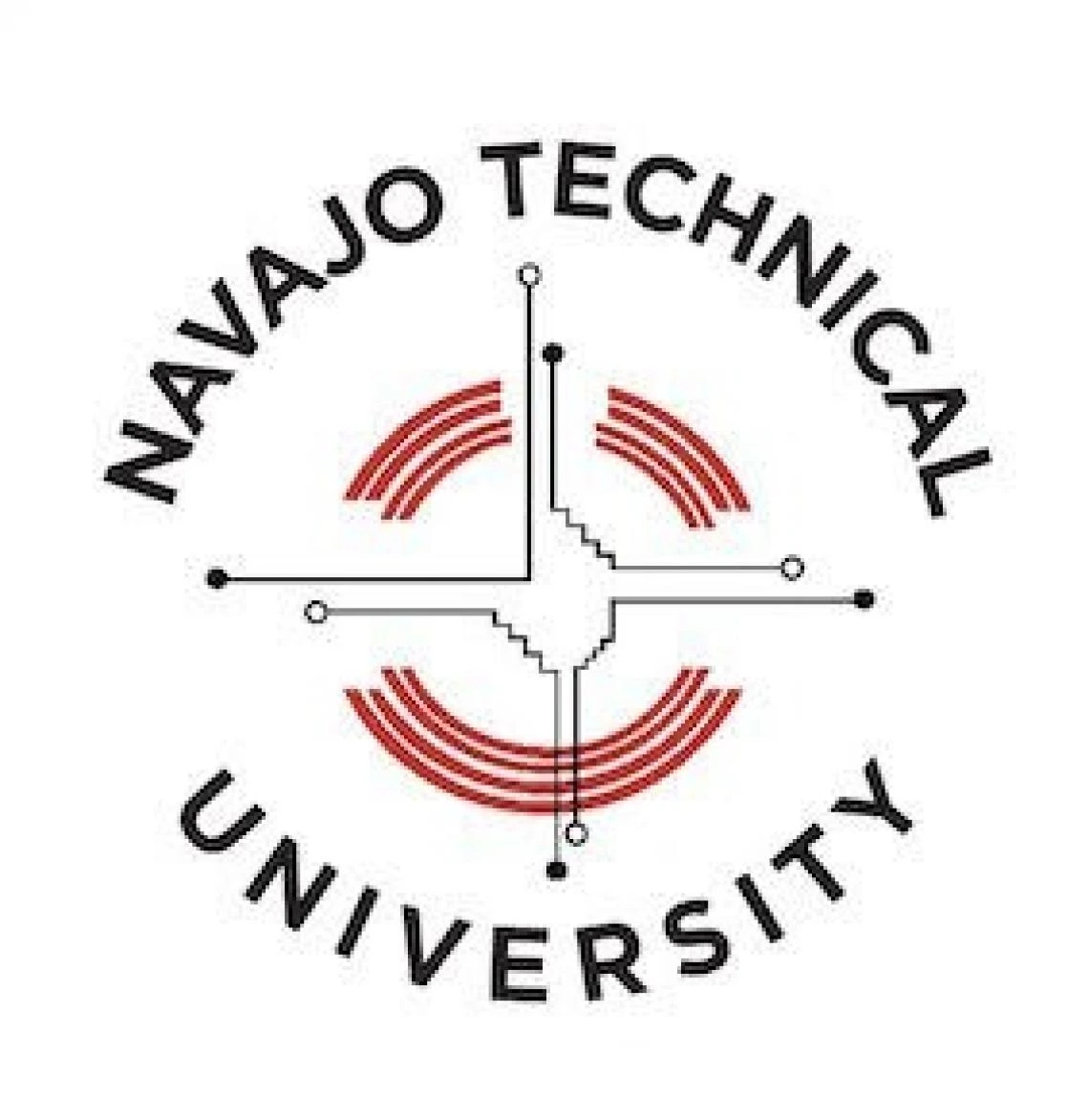
Navajo Technical University, Partners include Dr. Harry Whiting, Dr. Peter Romine, Dr. Gohlam Ehteshami, Dr. Scott Halliday, Dr. Steven Chischilly, Dr. Juanita Francis
Tohono O’odham Community College, Dr. Teresa Newberry and Dr. Kimberly Danny
San Carlos Apache College, Dr. Martin Ahumada
Navajo Tribal Utility Authority, Rex Kontz
Indian Health Services, Dr. Peter Littlehat
Navajo Nation Department of Water Resources, R. Crystal Tulley-Cordova
STAR School, Mark Sorensen
Tolani Lake Enterprises, Bill Edwards
Former Delegate to the Navajo Nation Council, Hon. Walter Phelps
Greyhills Academy STEM Teacher, Mrs. Reny Mathew
Indige-FEWSS Advisory Committees
Internal Advisory Board
Greg Barron-Gafford | School of Geography, Development & Environment | gregbg@arizona.edu
Andrew Carnie | Dean, Graduate College | carnie@arizona.edu
Gene Giacomelli | Biosystems Engineering | giacomel@arizona.edu
James Hopkins | Udall Center, American Indian Studies | hopkinsj@arizona.edu
Allison Huff | Health Sciences | allison7@arizona.edu
Tristan Reader | American Indian Studies | treader@arizona.edu
Trent Teegerstrom | CALS Cooperative Extension | tteegers@arizona.edu
Joan Timeche | Native Nations Institute | timechej@arizona.edu
Ronald Trosper | American Indian Studies | rltrosper@arizona.edu
External Advisory Board
Michael Bernier | Coca-Cola Swire Corporation
Ted Burhans | Tucson Electric Power (TEP)
Kern Collymore | Sixth World Solutions
Scott Haase | National Renewable Energy Laboratory (NREL)
Peter Littlehat | Indian Health Service (IHS)
Bryan Neztsosie | Navajo Community Member, Extension & Research Specialist at Diné College Land Grant Office
Walter Phelps | Navajo Community Member, former Delegate to the Navajo Nation Council
Donald Robinson | Diné College, School of Science & Technology
Juanita Francis | Navajo Technical University School of Engineering
Suzanne Singer | Native Renewables
Mark Sorensen | Director, STAR School
